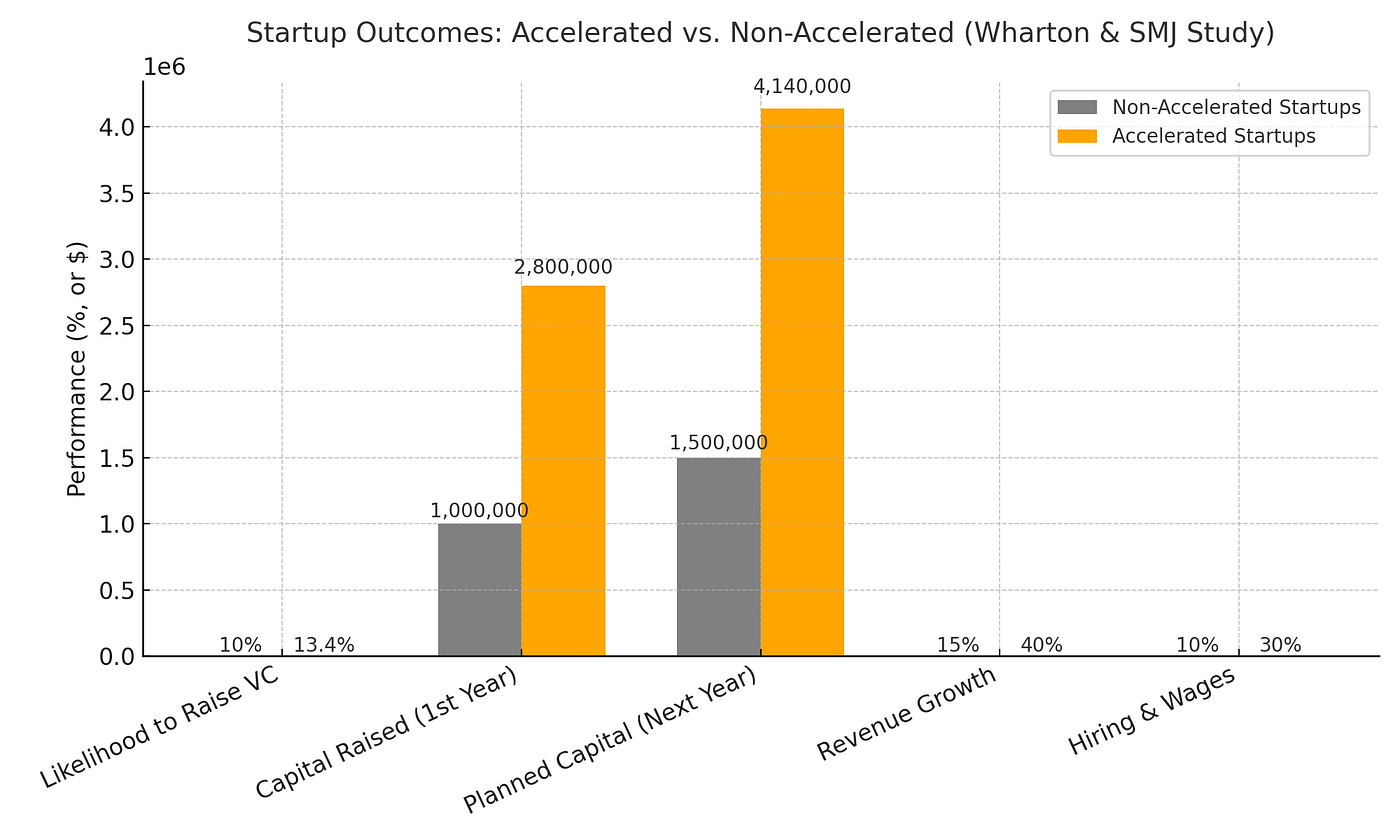
How Startup Programs Fuel Founders

When it comes to the world of entrepreneurship, it may seem like an unfamiliar and uncertain realm. Many people might find themselves confused about where to start and frustrated by the timeline of the process. People may understand the difficulty of the process, but do not realize what steps they should take. The entrepreneurial ecosystem runs far and wide with resources like incubators and accelerators that provide structure and guidance.

What exactly is an incubator?
An incubator is a program designed to aid startups and help them get to a point where they can fulfill their business potential. They provide support while a company is in its earliest stages, including the ideation stage. An incubator can be thought of as a greenhouse and a startup is the seed that is trying to sprout. These programs give startups the time and resources to grow, and the space to flourish. The length of the program can vary, lasting from a few months or up to a few years. The main goals for an incubator can also differ depending on the stage a startup is at, like creating a minimum viable product (MVP) or coming up with a game plan. Incubators provide a space for companies to develop at their own pace. Companies are less likely to be accepted into this type of program if they already have an MVP, but there is plenty of room for them in accelerator programs once they’ve reached this point.

What exactly is an accelerator?
An accelerator is a program that provides startups with guidance, support, and limited funding. To keep up with the plant metaphor, think of an accelerator program feeding your sprouted seed with the best soil, fertilizer, and watering schedule to promote growth. Accelerators are meant to aid in rapid growth, and can typically last from 3 to 6 months. These programs allow founders with others who may be in the same stage as them, and give plenty of opportunities to connect with investors, especially with events like demo days.
For some, to be considered, they want to see that you have more than an idea; they’re looking to see the fruits of your labor. Which may look like an MVP, but could also look like the tested solution to a problem that has yet to be solved or just an extremely compelling pitch. Some will want to see that you have a strong team, a great concept, and potential for competitive advantage, amongst other things. Some programs might at least require an MVP.
“We’re looking for more than an idea on a napkin,” said Selena Skorman, Regional Vice President of Gener8tor in Oklahoma City. “Let’s say you’re developing a SaaS; you have to have the software kind of complete so that we can put it in front of customers.”

It takes time, commitment, and effort to really make the most out of the process.
What benefits can these programs offer early startups?
Participating in either of these programs can offer many benefits that a startup may not have had access to or been aware of. Startups can gain a great deal from the experience, from an environment to test their product, to access new audiences, to talent acquisition. Incubator and accelerator programs also give startups access to investors, which not only can lead to funding, but also expertise, connections, and validation. These programs can also just play a big role in a company’s success.

Two Wharton professors Valentina Assenova and Raphael (Raffi) Amit conducted a study on the performance of accelerated startups. Within the study, they observed over 8,500 startups that had made it past the initial screening stages at 408 accelerators in various countries between the years 2013 and 2019. They found that startups that went through these programs were 3.4% more likely to raise venture capital. Assenova also noted that, “Accelerated startups also generated more revenue, hired more full-time employees, and paid more in wages to their employees, on average — indicating that they were scaling faster than their peers.” Through this study, Assenova and Amit both learned that accelerator programs have become essential for entrepreneurs and startups worldwide.
Anna Cobb, CEO & Founder of Rejuvenation, a plant-based beverage company, went through an accelerator program with a set of goals she sought to accomplish. “It gave us a massive credibility boost and opened doors to partnerships, funding, and opportunities that would have taken years to reach on our own,” she said. “The mentorship and peer support pushed me to think bigger and move faster.” Cobb also stated that she learned about her own resilience and resourcefulness through committing to this experience and allowing herself to show up fully. These programs not only allow for companies to grow, but mindset growth as well.

We’ve gained a bit of understanding of both resources, but it is important to note that all programs are not the same. Each program will differ in approach, focus, cost, effectiveness, and requirements. As an early startup looking to commit to either an incubator or accelerator, it is necessary to research which one will best fit you and your goals, especially to get an understanding of what you will be getting into.
What programs does Oklahoma have to offer?
As Oklahoma continues to grow, it also continues to innovate, becoming a state where ideas can flourish. The state has put much effort in recent years, bolstering the innovation seen here. With all the potential found in Oklahoma, it is helpful to know some of the programs helping to guide that potential.

Incubators
- Startup 405: A certified incubator with the goal of helping companies grow in a supportive environment. Their vision is to create jobs, enhance the entrepreneurial climate, retain businesses, build and accelerate growth in local industries, and diversify local economies.
- Gradient Incubator: A Tulsa incubator launched in 2021 that is now the largest tech incubator in the region. This program provides personalized guidance, financial benefits, expert mentorship, investor introductions, and much more.

Accelerators
- Startup OU: Startup OU offers a Founders in Residence program that takes place over the course of a semester. This program helps entrepreneurs tackle early-stage issues and provides founders with mentorship, funding, and training to help them grow into success. At the end of the program, the top teams receive the chance to pitch in the Startup Showcase, where they are met with potential investors and other members of the ecosystem.
- StitchCrew: This organization offers multiple accelerator programs focused on supporting small business founders, mainly with a focus on women and minorities. The goal of StitchCrew is to help these founders succeed, but also to drive change within the industry. The duration of each program varies, with some lasting six weeks, with others, like their Vesting Women program, lasting a full year.
- ACT House: 6-month program based in Tulsa that takes founders through two phases. Phase 1 contains focus areas such as business foundations, product development, and customer persona. Phase 2’s focus areas are all about negotiating, navigating partnerships, and building systems. ACT House strives to propel Black and Latino founders who are regularly unable to secure as much funding in comparison to white founders.
- Oklahoma Grassroots Rural & Ag Business Accelerators: This is a collaborative initiative assembled by the Oklahoma Farm Bureau. Their programs are comprised of two tracks with the goal of contributing to agricultural and rural innovation for companies based in less-populated (<50,000) communities. Founders can expect innovation pipelines, business training, and personal mentorship from these programs.
“There’s been so much momentum around startups and entrepreneurship in Oklahoma,” said Selena Skorman. “It’s up to our community to figure out how we can best meet founders where they are and support them.”
These programs are powerful tools for startups trying to find their footing and have been proven beneficial for those who have gone through the process. As Selena mentioned previously, as a community, it is key to ensure that new founders and startups know there is such a thing to support them. There doesn’t have to be as much unfamiliarity and uncertainty when you know what resources are available to you.
About Cortado Ventures
Cortado Ventures is an early-stage venture capital firm that invests in ambitious, growth-driven companies to define a new generation of economic prosperity for the Midcontinent region. As one of the largest VC funds in Oklahoma, Cortado’s focus is on tech companies bringing innovative solutions to the energy, logistics, life sciences, aerospace, and the future of work sectors. For more information, visit cortado.ventures.
More information about Startup 405.
More information about Gradient Incubator.
More information about Startup OU.
More information about StitchCrew.
More information about ACT House.
Works Cited:
2. Knowledge at Wharton. https://knowledge.wharton.upenn.edu/article/do-accelerators-improve-startup-success-rates/
3. SVB. https://www.svb.com/startup-insights/startup-growth/how-do-startup-accelerators-work/
4. Venture Capital Journal. https://www.venturecapitaljournal.com/oklahomas-plan-to-become-an-innovation-leader/
7. Blockchain Founders Group. https://blockchain-founders.io/what-is-a-startup-incubator-everything-you-need-to-know/
